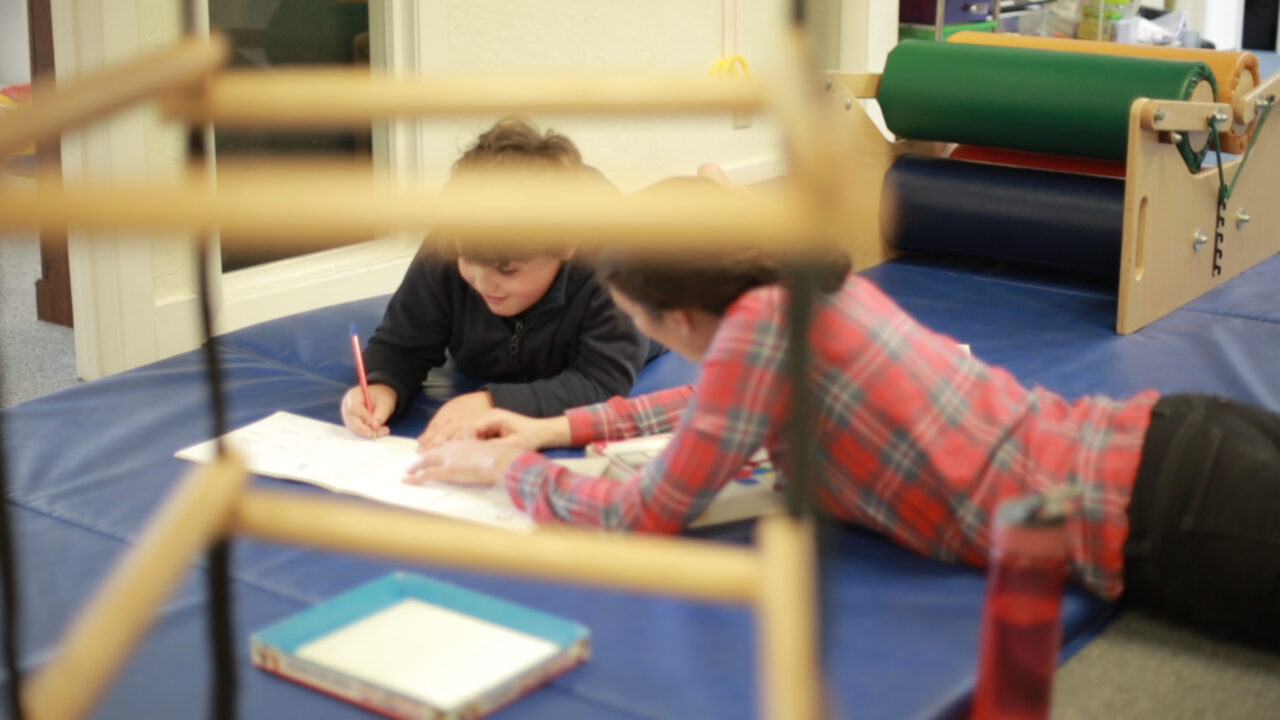Group Therapy
Group therapy activities are based on the foundations of sensory integration and blend parts of the “zones of regulation” self-regulation program and the social thinking curriculum. Types of groups include:
- Courageous Kids
- Self Regulation
- Sibling Sessions
- Social Skills
- Kindergarten Readiness
- Feeding Therapy
- Social Dyads

Group Therapy Services
Courageous Kids is a group behavioral therapy program designed by Occupational Therapist and Little Hands Founder, Gabrielle Perelmuter MOT OTR/L. The program has been designed to support preschool and elementary aged children with various anxiety based disorders such as (but not limited to):
- Selective Mutism
- Sensory Processing Disorder
- Autism
- Social Anxiety
The goal of the program is to encourage children to communicate and participate more freely and comfortably in school and other social settings. We create a classroom-like setting that offers children a safe environment to practice verbal participation through “courageous talking”, “courageous moving”, and “courageous playing”. Children are positively reinforced for being brave and courageous! The group is co-led by Occupational and Speech Therapists, and its curriculum is designed using leading research in sensory integration, social thinking and research from the Child Mind Institute.
Please contact us if you are interested in joining our group.
These groups help children work together to learn the following self-regulation skills:
- Understanding their own unique sensory system
- Matching their arousal levels to a particular activity
- Tools to assist with self-regulation in a classroom
- Tools to assist with emotional self-regulation when interacting with others
- Independence in identifying individualized sensory needs
In these therapist-facilitated sessions, siblings engage in various play-based intervention activities that foster cooperation, and teach self-regulation strategies to improve problem solving during sibling conflicts. Additionally, parents and caregivers are educated on various strategies to implement in home environments to support happy and cooperative sibling relationships.
These groups utilize a sensory-motor based approach to help children learn and practice social skills through movement, and how to understand their bodies in relation to their environment. Targeted skill enhancements include:
- Making and keeping friends
- Entering play
- Appropriate play
- Showing good sportsmanship
- Flexibility in play
- Physical and emotional regulation during play
- Expressing/ understanding feelings during play
This exciting and dynamic group focuses on easing transitions, understanding the expectations of a classroom, handwriting readiness, making new friends, following directions, and self-regulation in classroom settings. The group is guided by a sensory-integrative approach incorporating movement, art, and music. Lessons are taught in a multi-sensory environment to optimize learning. The Handwriting Without Tears curriculum is used to provide a fun, tactile, and creative foundation for pre-writing readiness and handwriting skills.
Our feeding groups adhere to a basic tenet of the SOS (Sequential Oral Sensory) Approach to Feeding: meet children at their developmental feeding level. This means that we never force a child to eat a non-preferred food. Instead, we guide children in climbing a developmental hierarchy of feeding skills and behaviors through active play and interaction with a variety of foods. This evidence-supported approach contributes to long-term improvement, so that children are able to comfortably and successfully increase food diversity at home, at school, on playdates, at birthday parties, and everywhere in between. We offer feeding interventions using a peer group model, which is an incredibly effective and powerful treatment modality in feeding therapy.
Social dyads are offered to children who have received an Occupational Therapy evaluation/assessment and whose therapy goals include social skill development and/or self-regulation goals. This dyad provides children with an opportunity to participate in therapy sessions with a peer who is working on similar goals.














